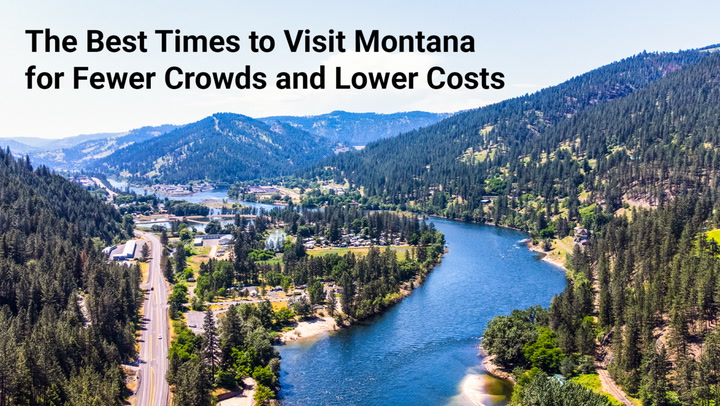1. Overview of Outdoor Adventures
2. Best Times for Smaller Crowds
3. Best Times for Good Weather
4. Best Times for Lower Prices
5. Best Times for Hiking
6. Best Times for Skiing and Snowboarding
7. Worst Times to Visit Montana
Discover the Best Times to Visit Montana for Outdoor Adventures
Montana is best known for its wide-open vistas and expansive wilderness. This incredible state is designed for adventurers—whether the adventure is on snow, trail, or waterway. Montana’s two high seasons, winter and summer, couldn’t be more distinct. Winters are long and snowy, attracting visitors eager to ski down powder-covered mountains, while summers offer colorful scenery with long, sunny days and cool nights. Mandy Hotovy, the general manager at The Wilson Hotel in Big Sky, Montana, expresses, “There’s a saying here in Big Sky that ‘people come for the winter and stay for the summer,’ and I would agree with that.”
:max_bytes(150000):strip_icc():format(webp)/TAL-montana-fall-WHENMONTANA0623-1e93f1d61c3c4497938113f2bac1ac94.jpg)
Best Times to Visit Montana for Smaller Crowds
In Montana, it’s noticeably quieter in the spring and fall. After ski areas close in early spring, a wonderful, crowd-free quiet descends upon many ski towns. Moreover, in the fall, as children return to school and the weather begins to cool, hikers can enjoy the wide-open trails with just a light extra layer. However, some outfitters, hotels, and tour operators close during the shoulder seasons, so double-check opening dates before your trip.
If you’re eager to explore Yellowstone National Park, Hotovy notes that the “secret season” is in the shoulder months. “May through June and September through October are some of the best times to visit,” she advises, emphasizing the lower visitation rates that offer a more intimate experience with nature and wildlife.
Best Times to Visit Montana for Good Weather
For those who associate good weather with powder days, schedule your trip between December and March when ski areas like Big Sky can receive up to 60 inches of snow per month, according to OnTheSnow reports. While December and January are generally the coldest months, with temperatures rarely exceeding 30 degrees, late winter visits in February or March can provide more comfortable conditions on the slopes.
Meanwhile, from July to September, visitors seeking warm weather and sunny skies will have their best experience. Hotovy points out that this period allows for “longer, warmer days that enable more outdoor recreation, alfresco dinners, and beautiful sunsets.” Particularly, September features pleasant temperatures, reaching the low 70s in locations like Bozeman, alongside the onset of fall foliage later in the month.
:max_bytes(150000):strip_icc():format(webp)/TAL-montana-summer-WHENMONTANA0623-8db87424c7dd47dc8211093fbbea9664.jpg)
Best Times to Visit Montana for Lower Prices
With smaller crowds come lower prices. Therefore, travelers seeking good deals should plan their trips during the spring or fall, the well-known shoulder seasons. Though the weather may be unpredictable, often fluctuating between snow and sunshine, prices during these times can be significantly lower. Hotels that are fully booked in peak winter and summer months often see more availability and reduced rates in spring and fall.
“Although some activities may have limitations,” explains Boldt, “the shoulder seasons from April to June and October to November are ideal for avoiding crowds and enjoying off-season rates.” If you’re hoping for better deals during high seasons, consider timing your visit for the least popular months. For instance, September is less crowded than July and August, while February often experiences lower visitor numbers compared to the holiday rush and the busy spring skiing season.
Best Times to Visit Montana for Hiking
The optimal hiking season near Glacier National Park typically spans from late July to mid-October. During this timeframe, there is generally little to no snow on the ground, creating clear hiking trails. “You can’t go wrong hiking around Big Sky in any of the summer months,” shares Greg Wagner, assistant general manager at Moonlight Basin, emphasizing the variety of wildflowers and wildlife experienced throughout the season.
Both Boldt and Wagner assert that hiking in September is particularly delightful. “September is hands-down our favorite month to hit the trails. Warm, sunny days mix with slightly colder nights,” says Boldt. Wagner notes that “the temperatures are perfect for outdoor activities, with crisp mornings and blue skies.”
:max_bytes(150000):strip_icc():format(webp)/TAL-montana-winter-WHENMONTANA0623-6a4944b0f7384c789f6741570e7de12b.jpg)
Best Times to Visit Montana for Skiing and Snowboarding
The ski season in Montana generally commences in late November and extends through mid to late April. However, according to Wagner, March stands out as his preferred month for skiing. “If I had to choose just one month, it would be March. Big Sky is renowned for its spring skiing and a plethora of powder days. With more daylight and warmer afternoons in March, it’s the ideal time for après-ski socials on the patios of our lodges after a day on the slopes.”
If your goal is to ski without experiencing large crowds, Hotovy suggests planning your trip after New Year’s and before Martin Luther King Jr. weekend. In this two-week “sweet spot,” she notes that visitors to Big Sky will encounter a quieter town and shorter lift lines, along with potential deals at the top slopeside resorts.
Worst Times to Visit Montana
With attractions available in every season, the “worst” time to visit Montana ultimately depends on individual preferences. If the idea of shops being closed and limited activities is unfavorable, spring and fall may not suit your needs, as many summer and winter resorts often close during these periods. Although you can find good deals during these times, you may miss out on fully experiencing what the state has to offer.
If large crowds are a concern, you may want to avoid summer, when Montana sees nearly 2.5 million visitors monthly, often overwhelming popular destinations with tourists. The final months of each high season—March and September—may strike a good balance, as most attractions and businesses remain open while drawing significantly fewer visitors than during peak times.




